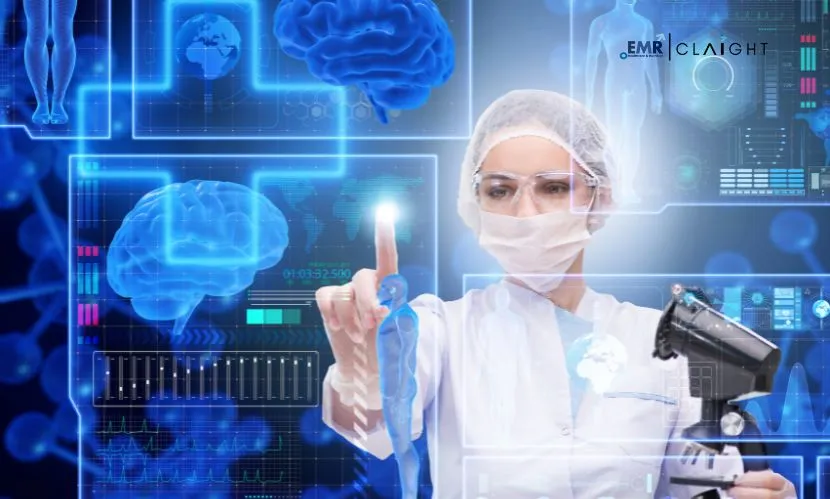Healthcare is a dynamic and ever evolving field with new trends emerging every now and then. The convergence of Information Technology and healthcare has become a catalyst, unlocking uncharted territories of services and technologies for both patients as well as healthcare professionals. Today, the healthcare and pharmaceutical landscape is witnessing significant advancements, dedicated to give customized and tailored services to the patients. As we step into 2024, let us explore the top healthcare trends poised to redefine the modern medical ecosystem.
AI and Gen AI in Healthcare
The rise of artificial intelligence is not only limited to tech but has entered the healthcare industry as well. It is widely applied in diagnostic support, predictive analysis, drug discovery and development, administrative efficiency, as well as remote monitoring and virtual health. As per Harvard School of Public Health, using artificial intelligence to make diagnoses can help optimize treatment costs by up to 50% and lead to overall improved health outcomes by nearly 40%. When using artificial intelligence guided technologies, the researchers at University of Hawaii were able to improve breast cancer risk prediction significantly. In the future, hybrid human-AI models are set to revolutionize the medical industry.
Gen AI, on the other hand, is a vital tool that helps in automating administrative tasks such as appointment scheduling, documentation and record keeping, billing and claims processing as well as data entry and extraction. The role is not limited to administrative work as the applications span across medical imaging, risk management, and pandemic preparedness too. In October 2023, Google Cloud launched Vertex AI Search for healthcare and life science organizations to facilitate a wider spectrum of clinical sources such as FHIR data and clinical notes. This initiative is aimed at combating workforce shortages along with administrative burden and provider burnout. The platform is expected to leverage Google Cloud’s Healthcare API and Healthcare Data Engine along with Google Health’s search and smart summarization capabilities from Care Studio, their pilot product.
Data Protection and Cyber Security
The onset of digital technology has streamlined numerous processes in the medical ecosystem. The global COVID-19 pandemic has pushed the world towards a tangent by normalizing digital health. According to EMR estimates, the global digital health market is expected to reach USD 1237.86 Billion by 2034, growing at an impressive CAGR of 22.10% between 2025 to 2034. At the same time, patient data protection and privacy has become a grave area of concern. Owing to the complex nature and sensitivity of patient data, cybersecurity has emerged as a challenge. Phishing attacks, ransomware, attacks to network vulnerabilities, data breaches and man-in-the-middle attacks are primary concerns for healthcare facilities.
Around 36% of healthcare facilities reported a rise in medical complications stemming from ransomware attacks. This increase can be linked to healthcare professionals' inadequate adherence to cybersecurity practices for data protection. As a result, the first and foremost step involves educating the healthcare professionals with IT security skills. Moreover, the installation of cybersecurity related software is an emerging trend in healthcare settings. HIPAA, GDPR (General Data Protection Regulation), which is the regulatory framework of the European Union, NIST (National Institute of Standards and Technology) cybersecurity framework and Payment Card Industry Data Security Standard (PCI DSS) are some of the vital frameworks dedicated towards preventing cyberattacks in the healthcare domain.
Wearables and Internet of Things
Wearables have carved a niche for itself in the healthcare domain, with devices such as smartwatches and FitBits garnering huge popularity. With the consumers becoming more aware, their interest in health and vital sign monitoring has grown. Consequently, wearable technology has observed an upward trajectory in the last couple of years. The growing adoption of smart devices along with rising healthcare expenditure and disposable incomes has propelled the Internet of Things market. As per EMR calculations, the market is anticipated to grow at a CAGR of 19.10% and projected to reach a value of USD 1276.26 Billion by 2034.
Analyzing the rising demand and popularity of wearables, prominent IT and healthcare companies have dived into developing innovative electronics to attract customers. Hence, the market has been flooded with numerous cutting-edge wearable devices. Wearable ECG monitors, blood pressure monitors and glucose monitors have become highly prevalent. One such example is Afon Technology’s non-invasive, needle free glucose monitor called Glucowear®, which aims at transforming the lives of diabetic patients with painless opportunities. Glucose patch monitors enabled with wearable biosensors are another latest addition to the market. These patches are worn on the upper arm and work by measuring glucose oxidase as a recognition molecule.
Genomics and Personalized Medicine
Personalized medicine is an emerging field in modern medicine, which is anticipated to grow at a CAGR of 10.9% with the market size likely to reach USD 968.56 Billion by 2034, as per EMR calculations. Itenables complete study of a patient’s genetic profile and helps in curating tailored solutions based on it. Diversifying from the conventional “one size fits all” approach, genomics and personalized medicine envision combating chronic illnesses. It is particularly impactful in oncology as it helps in providing guided immunotherapies and targeted therapies for the condition. The rapid evolution of next generation sequencing techniques has decreased the cost of genomic sequencing, making it accessible and affordable at the same time. Single cell genomic technologies also enable an improved understanding of diseases at molecular level as they offer a deeper insight into cellular heterogeneity.
Preventive Healthcare
The outbreak of COVID-19 shook the entire world to its core and highlighted the ill-preparedness of even the developed countries. The healthcare industry has been witnessing ample investments on developing and strengthening telehealth services resulting in significant market size growth. According to EMR estimates, the market is poised to attain a value of USD 981.15 Billion by 2034 growing at an impressive CAGR of 23.00% during 2025-2034. In addition, remote consultations are on the rise for both physical as well as mental conditions. The rising demand can be attributed to the dynamic and fast-paced lifestyle of the population. As video consultations can be easily accommodated per the convenience of both patients and healthcare experts, they have become a favorable alternative. Companies have started expanding their portfolios to grant such services to the patients, impacting preventive healthcare market size growth, which is likely to achieve a value of USD 873.13 Million by 2034.
3D Bioprinting of Organs
3D bioprinting is a technology that uses bioinks to print living cells and construct them layer by layer so that they start mimicking the behavior and structure of natural organs. While 3D printing is not an entirely new concept, it has been experiencing rapid evolution with increasing innovation and advanced understanding of the human body. 3D bioprinting plays a critical role in tissue engineering and helps in fabricating functional tissues for applying regenerative medicine and drug testing. It also facilitates replacement and repair of damaged organs.
In May 2023, University of California researchers partnered with Bioprinting Solutions to develop 3D-printed heart tissue. Organovo Holdings also announced their FDA approval to begin clinical trials of 3D printed bladder tissues in April 2023. Nevertheless, there has been notable investigation for smarter and more effective biomaterials to be used in 3D bioprinting, which is likely to boost the market value to USD 5.15 Billion by 2034 with a CAGR of 8.4%. The validation from prominent research institutions and regulatory authorities plays a vital role in indicating the growth of 3D organ bioprinting in coming years.
As we embark into a new year, the healthcare industry stands at a transformative stage. The trends explored above are a mere glimpse into the future as medical science and technology continues to progress and offer wonders to the patients. From artificial intelligence integration to the profound impact of genomics, the times ahead promise a paradigm shift into healthcare approach. However, it is equally crucial for researchers and healthcare professionals to be able to adapt and harness the latest advancements to offer better outcomes.




















Share